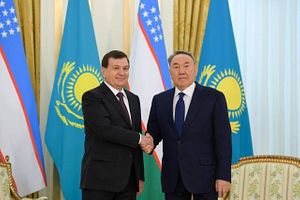The presidents of Uzbekistan and Kazakhstan both want greater foreign investment to maintain economic stability and growth in their countries. Uzbek President Shavkat Mirziyoyev’s call for increased foreign investments was akin to announcing a state of emergency in which ministries and regional governors would become active seekers of investments. In contrast, Kazakh President Nursultan Nazarbayev’s call was narrower. Following institutional reshuffles, he designated the Foreign Affairs Ministry as the main body to attract investments.
Mirziyoyev announced 2019 as the “Year of Investment and Social Development.” With that, the state has aimed to mobilize its resources for the specific purpose of attracting investments. Mirziyoyev’s emphasis on the issue came in his two-and-a-half hour state-of-the-nation address on December 28, 2018. He ordered government officials to work hard to “create a [favorable investment] climate and remove any obstacles.”
When Mirziyoyev went off-script during the same address, he explained the reasons for his sense of urgency: “[The] last two years were difficult for the economy of Uzbekistan. The regional governors and district governors, ministries, and companies who fail to create an investment climate have no future. [The rest of] the world has developed this way; so will we. There is no other way.” Mirziyoyev added that increased flow of investments should be behind each decision lawmakers and officials take and to achieve this the officials would need to change their worldview.
Mirziyoyev’s message came across as declaring a state of emergency, in a way, for officials to attract investments. The president’s call makes clear that the performance of each official will be evaluated against their ability to launch new projects with investors.
Kazakhstan is similarly entering a new period of attracting investments at the order of the president. Although the push comes across as less urgent than Uzbekistan’s, Nazarbayev recently decided to make significant reshuffles to the Ministry of Foreign Affairs and add new functions to the ministry to facilitate investments.
Nazarbayev replaced the leadership of the foreign ministry with Beibut Atamkulov, a former diplomat and most recently the minister of Defense and Aerospace Industry. In a move to expand the functions of the Ministry of Foreign Affairs, Nazarbayev transferred the investment functions previously overseen by the Ministry of Investments and Development (since renamed the Ministry of Industry and Infrastructural Development). In addition, two major state investment organizations, the Committee for Investments and the Kazakh Invest National Company, will continue operating under the Foreign Affairs Ministry.
Nazarbayev also ordered Kazakhstan’s embassies around the world to become the frontlines of attracting investments by somewhat derisively pointing out that the country’s embassies have enough time at their disposal to work with potential investors: “[Kazakhstan is] neither Russia nor China or the United States — what global issues do we have to deal with?… Nobody knows what they do there…”
Notably, ordering embassies to engage actively in soliciting investments is where Mirziyoyev and Nazarbayev converged. Mirziyoyev also ordered the embassies of Uzbekistan to engage in the process of attracting investment. Both countries thus will be experimenting with elevating their respective foreign ministries and their embassies to promote investment opportunities. The embassies of both countries will likely enter into a healthy competition for many of the same investors.
Uzbekistan’s push for investments is understandably far more extensive than Kazakhstan’s. Foreign investments are crucial to sorting out Uzbekistan’s economic issues, accumulated over many years of difficult relations with the wider world. The call also comes amid a wider economy-oriented reform program. By contrast, Kazakhstan’s changes were limited to the leadership and institutional reshuffles. Whether these twin efforts were coincidence, coordinated, or simply a response to outside market forces is unclear.

































